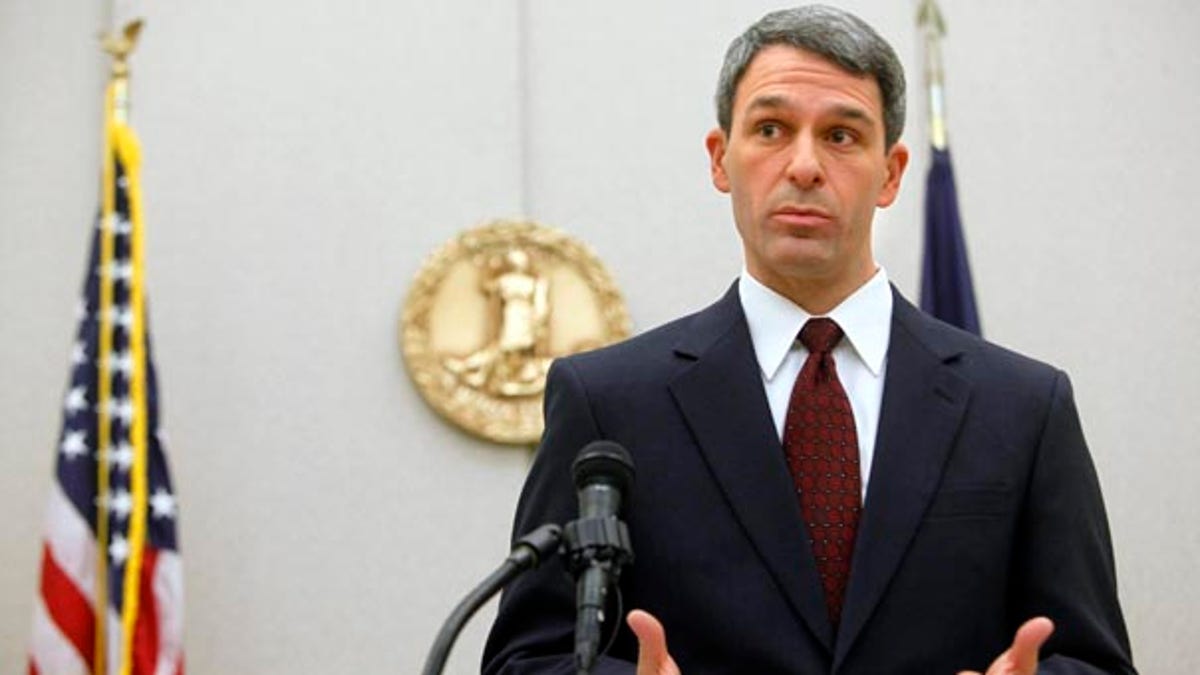
FILE: In this Dec. 13, 2010 photo, Virginia Attorney General Kenneth Cuccinelli speaks about the ruling from U.S. District Judge Henry E. Hudson, who decided in favor of the attorney general's claim that the individual mandate in the health care law is unconstitutional. (AP/Richmond Times-Dispatch)
Arguing that a definitive legal ruling on the constitutionality of President Obama's health-care law must come without further delay, Virginia Attorney General Ken Cuccinelli filed a petition Wednesday asking the Supreme Court to immediately consider the issue and not wait for the judgment of a lower appellate court.
Cuccinelli's 23-page filing says there's a "palpable consensus" in the country that Supreme Court will ultimately be asked to decide the question and that the nation is better served if the justices take the case now.
"The presence of pure issues of constitutional law on the merits ensures that normal appellate practice will not further focus the controlling issues, which, in any event, are bottomed on decisions of this Court," wrote Cuccinelli and Virginia Solicitor General Duncan Getchell.
The Supreme Court rarely accepts cases that haven't had at least one round of appellate review.
"We do so much better when we have the views of other federal judges who are certainly no less qualified than we are. Then we have a range of views before us and we can make a better informed decision," Justice Ruth Bader Ginsburg told an audience in Washington last week.
In November, the Supreme Court rejected without comment a similar request for expedited review of a challenge to the health care law from California. That case, however, was dismissed before a judge decided on the merits of the law. Four federal judges across the country have ruled on whether the legislation is constitutional -- two in support of the law and two who said it did not pass the legal test.
U.S. District Judge Henry Hudson in Virginia concluded the requirement that individuals must buy health insurance or face financial penalties violates the Constitution's Commerce Clause.
Neither Hudson nor U.S. District Judge Roger Vinson in Florida, who also ruled against the Obama administration, opted to stop the government from continuing to implement preliminary measures required under the law while the cases are appealed.
Cuccinelli argues that while the so-called individual mandate doesn't go into effect until 2014, the cost is immediate as lawmakers, businesses and individuals have to determine how to plan and pay for the insurance. As a result, Cuccinelli argues, "citizens and businesses are widely believed to be reducing spending and delaying hiring in response to the overhang of uncertainty."
Virginia's case is currently pending before the Fourth Circuit U.S. Court of Appeals in Richmond, Virginia. Oral arguments are scheduled for May.
"The (Justice) Department continues to believe this case should follow the ordinary course of allowing the court of appeals to hear it first so the issues and arguments concerning the Affordable Care Act can be fully developed before the Supreme Court decides whether to consider it," Justice Department Spokeswoman Tracy Schmaler said last week after Cuccinelli announced he would petition the high court.
It isn't immediately clear if the Justice Department, through the solicitor general's office, will oppose the expedited hearing. The department didn’t file a motion in opposition in the California case last year.
Twenty-eight Republican governors sent a letter to Obama Wednesday asking him to direct the Justice Department to file a response in support of Cuccinelli's motion. The governors wrote that "public interest requires expediting a final resolution of the litigation to give certainty as soon as possible."
Supreme Court rules allow for expedited review in cases that are "of such imperative public importance as to justify deviation from normal appellate practice." At least four justices must agree to the request in order for the court to hear the case.
In her comments last week, Ginsburg noted that there have been times when the court resolved an urgent dispute. She cited the famous Steel Seizure and Pentagon Papers cases as specific instances when the court jumped in, but she apparently thinks the fight over the health care law doesn't rise to that level of concern.
"The court itself is a reactive institution," she explained. "We don't decide, 'We better get that health care case sooner rather than later.' We wait until the case goes through the ordinary route."




